|
|
|
Sort Order |
|
|
|
Items / Page
|
|
|
|
|
|
|
| Srl | Item |
| 1 |
ID:
111597
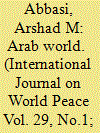

|
|
|
| 2 |
ID:
132964
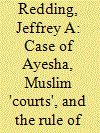

|
|
|
|
|
| Publication |
2014.
|
| Summary/Abstract |
This paper aims to challenge the disparagement of non-state Islamic systems of law that has established firm roots in contemporary rule of law ideology and practice around the world, from India to Ontario. In this respect, rule of law ideology has tended to ignore actual mechanics and procedures of law, not only in legal venues outside the state's direct control, but also in the state's courts themselves. With respect to non-state legal venues-and especially non-state Islamic legal venues-such ideology understands and describes the practices and procedures that it finds in these non-state venues as crude and underdeveloped at best, and illiberal and in violation of the rule of law at worst. While other scholarly work has vividly demonstrated the various transformations and mutations that any state's 'ideal legal procedure' experiences as it is put into real-world practice by a state's courts and judges, this paper makes a converse move. Using a case-study focused on the circumstances and experiences of an Indian Muslim woman, 'Ayesha', who recently used a Delhi dar ul qaza to exercise her Islamic divorce rights in India, this paper demonstrates how a non-state Islamic legal venue behaves in ways which are highly evocative of rule of law ideology's idealization of state courts and how they (should) operate procedurally. In doing so, this paper provides evidence for Partha Chatterjee's thesis as to how elite and subaltern domains-understood here to be embodied in both state and non-state legal venues, respectively-are products of 'mutually conditioned historicities'. In this case, the focus is on the state's conditioning of the non-state. As a result, rule of law ideology's state-oriented critique of the (Islamic) non-state is mistaken because, as this paper demonstrates, the non-state is produced in conversation with the state; one cannot critique the one (non-state) domain without realizing how that critique implicates the other (state) domain.
|
|
|
|
|
|
|
|
|
|
|
|
|
|
|
|
| 3 |
ID:
132380
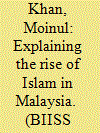

|
|
|
|
|
| Publication |
2013.
|
| Summary/Abstract |
Malaysia, since the 1970s, saw a trend of increasing adoption of Islamic values both at private and public levels, often referred to as the Islamic resurgence. This has led to an academic interest whether this upsurge of Islam in that country has been driven mainly by Islamic ideology that aims at establishing a universal Islamic order or other circumstances specific to Malaysia. This paper seeks to provide an illuminating explanation to this riddle. Having reviewed the trends of Islamic profile and the main reasons behind it, this paper finds that the ethnic conflict over material interests between the local Malays and non-Malays, political rivalry between two main parties, UMNO and PAS and the consequences of widening gap between the rich and the poor as a result of massive economic programmes, have all prompted the urge for mounting Islamic profile. Had there been no such competition, Islam would have remained marginalised as happened till the 1970s. However, in later times, Islam came as a means or instrument to express discontent by these competing interest groups towards each other. The key element of this analysis is to show that it is context that has largely stimulated the profile of Islam in Malaysia rather than eagerness, the inherent association with Islamic ideology, to establish an Islamic state and a universal order. Findings of this paper reinforce the view that Islam is not necessarily one and uniform and is not essentially linked to politics of ruling and resisting.
|
|
|
|
|
|
|
|
|
|
|
|
|
|
|
|
| 4 |
ID:
154239
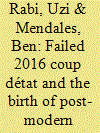

|
|
|
| 5 |
ID:
078412
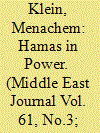

|
|
|
|
|
| Publication |
2007.
|
| Summary/Abstract |
This article challenges the static approach to Hamas as a simple fundamentalist organization by analyzing its political documents. It shows that Hamas' Islamist ideology has not prevented it from moving from fundamentalism to radicalism. Hamas has innovated ways of allowing its leaders to declare or acquiesce in political positions that contradict its fundamentalist creed. Hamas accomplished this change in the course of a domestic debate. The international boycott of its government did not create the change - Hamas began to talk in two voices before winning the 2006 elections.
|
|
|
|
|
|
|
|
|
|
|
|
|
|
|
|
| 6 |
ID:
127270
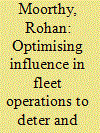

|
|
|
| 7 |
ID:
128093
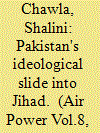

|
|
|
|
|
| Publication |
2013.
|
| Summary/Abstract |
Pakistan has been in existence for more than six decades but the state has not been able to define its identity till date. Pakistan has been a nation of contradictions; it has shared an ambiguous relationship with Islam, tried to embrace Western notions of modernity, and , at the same time, tried retaining the orthodox Islamic identity, has an overpowering and ambitious army which has ruled the nation for more than 30 years directly, and nearly an equal period with a civilian façade, but has still struggled periodically to go back to the domestic order controlled by the fractured political leadership and has suffered a deep national identity crisis. Lack of identity has encouraged the rise of ethnicity and pluralism with in the Pakistani society. Born as a result the demand of a separate Muslim homeland, it eventually stood as the saviour of Islam and, in the process, the military led state has adopted policies based on religion which have had severe repercussion for the state. Religion has been used in Pakistan for a range of issues from nation-building to strategic security,
|
|
|
|
|
|
|
|
|
|
|
|
|
|
|
|
| 8 |
ID:
144633
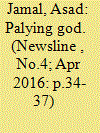

|
|
|
| 9 |
ID:
028281
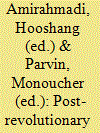

|
|
|
|
|
| Publication |
Boulder, Westview Press, 1988.
|
| Description |
vii, 262p.hbk
|
| Standard Number |
0813372275
|
|
|
|
|
|
|
|
|
|
|
|
Copies: C:1/I:0,R:0,Q:0
Circulation
| Accession# | Call# | Current Location | Status | Policy | Location |
| 030225 | 955.054/AMI 030225 | Main | On Shelf | General | |
|
|
|
|
| 10 |
ID:
127281
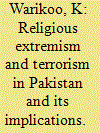

|
|
|
| 11 |
ID:
041480
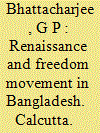

|
|
|
|
|
| Publication |
Calcutta, Minerva Associates, 1973.
|
| Description |
viii, 361p.hbk
|
|
|
|
|
|
|
|
|
|
|
|
Copies: C:1/I:0,R:0,Q:0
Circulation
| Accession# | Call# | Current Location | Status | Policy | Location |
| 011626 | 954.9204/BHA 011626 | Main | On Shelf | General | |
|
|
|
|
|
|
|
|
|